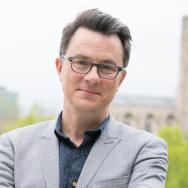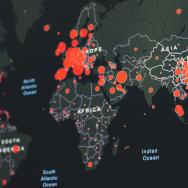As the bubonic plague made its way westward from China in the 14th century, Christians, Muslims and Jews in its path thought anxiously about what practices of public health and of piety might save them.
In the 21st century, as COVID-19 spreads much more rapidly around the globe, we see similar debates over public health and religion. In this virtual Harper Lecture, University of Chicago Divinity School dean David Nirenberg compares his research on reactions to the Black Death in the Middle Ages with the results of polling on religion and COVID-19 in the United States today.
“We don’t know how profound the lasting effects of COVID will be, and that’s a source of great anxiety and uncertainty,” he said during his June 8 lecture.
A leading scholar of the interactions between Jewish, Christian and Islamic cultures, Nirenberg led a recent project that polled American religious practices during the pandemic, conducted in partnership with the Associated Press-NORC Center for Public Affairs.

